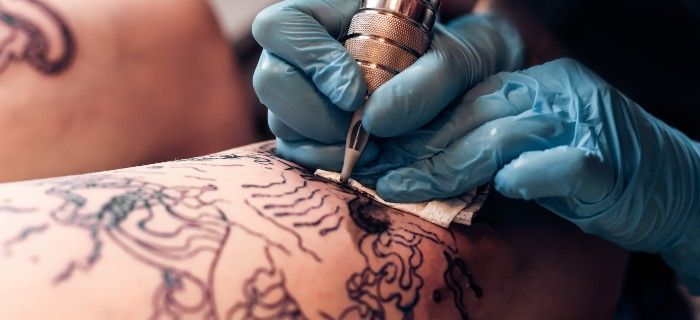Tattooing has become a popular form of body art, especially among young adults. However, along with its increasing popularity, dermatologists have observed a rise in complications such as allergic reactions, infections, and even reactions to tattoo ink that can mimic skin cancer. In this article, we will explore the risks associated with newer tattoo inks and provide insights on how to keep your tattooing experience safe and enjoyable.
Table of Contents
ToggleThe Composition of Tattoo Ink
Over the years, the composition of tattoo ink has significantly changed. Previously, inks contained metal salts, lead, cobalt, and carbon. However, modern tattoo inks, particularly intense reds and yellows, now contain organic azo dyes with plastic-based pigments. These pigments are also used in printing, textiles, and car paint. Due to these changes, there are many unknowns regarding how these inks interact with the skin and the body, potentially leading to complications.
Allergic Reactions and Chronic Skin Conditions
One of the most common problems associated with tattooing is allergic reactions to tattoo pigments. Itching, bumps, or rashes can occur days, months, or even years after getting the tattoo. These reactions can be treated with topical steroid ointments. However, it is essential to note that in some cases, the affected person may not suspect that the tattoo is the cause of the allergic reaction, especially if it occurs months or years later.
For individuals with pre-existing skin conditions like psoriasis and eczema, tattoos may trigger flare-ups, exacerbating these chronic skin conditions. It is crucial to consult with a board-certified dermatologist before getting a tattoo if you have these conditions.
Autoimmune Reactions and Infections
In rare cases, tattoos may trigger autoimmune reactions like sarcoidosis, characterized by swelling and itching. These reactions can occur decades after the tattoo procedure and may involve other organs, such as the lungs or eyes. Treatment options range from topical creams to immunosuppressant medications.
Infections are another concern related to tattooing. Common infections include localized bacterial infections, syphilis, and hepatitis B and C. It’s worth noting that outbreaks can stem from contaminated tattoo ink rather than the tools used during the procedure. Atypical mycobacterial infections, traced back to contaminated tattoo ink, can cause itchy, painful pustules and red bumps within a tattoo during the first month of the procedure. Treatment for this type of infection often requires several months of oral antibiotics.
Skin Cancer and Tattoo Placement
Skin cancer can also develop within a tattoo. It is crucial for tattoo artists to avoid placing a tattoo over an existing mole, as it may make it difficult to distinguish between a bump caused by the tattoo and skin cancer. In such cases, a biopsy is required to determine the nature of the bump. In some instances, additional surgery may be necessary for treatment. Tattoo ink is believed to be the cause of this uncommon reaction, potentially leading to unnecessary and costly skin cancer treatments.
Tips for Safe Tattooing
If you’re considering getting a tattoo, follow these tips to ensure a safe experience:
- Choose a professional tattoo parlor and a licensed tattoo artist who meets the state’s requirements.
- Insist on seeing the equipment being used in sterile packaging.
- Inform the tattoo artist if you experience any adverse reactions. If the problem persists for more than one to two weeks, consult with a board-certified dermatologist.
- If you have a chronic skin condition like psoriasis, eczema, or a tendency toward keloid scarring, consult with a board-certified dermatologist before getting a tattoo.
- Avoid tattooing over moles as it may complicate the diagnosis if the mole changes in the future.
Frequently Asked Questions
Q: Are all tattoo inks the same?
A: No, tattoo inks can vary in their composition, with modern inks often containing organic azo dyes and plastic-based pigments. It’s important to be aware of these differences and understand the potential risks associated with specific ink formulations.
Q: Can tattoos cause skin cancer?
A: While tattoos themselves do not cause skin cancer, it is possible for skin cancer to develop within a tattoo. Tattoo artists should avoid placing tattoos over existing moles to minimize the risk of confusing a cancerous bump with a tattoo-related reaction.
Q: How can I ensure the safety of my tattooing experience?
A: Choose a reputable tattoo parlor and a licensed tattoo artist. Insist on sterile packaging for equipment and report any adverse reactions to both the tattoo artist and a board-certified dermatologist if necessary.
Conclusion
As the popularity of tattoos continues to rise, it is essential to be aware of the potential risks associated with tattooing. Tattoo ink composition has evolved significantly, and while many unknowns remain, following safety precautions and seeking professional guidance can help mitigate complications. By making informed choices and consulting with dermatologists when needed, individuals can enjoy their tattoos while minimizing risks to their health and wellbeing.
For more information about tattoo safety and TKTX Numbing Cream products, visit the TKTX Numbing Cream Store.






